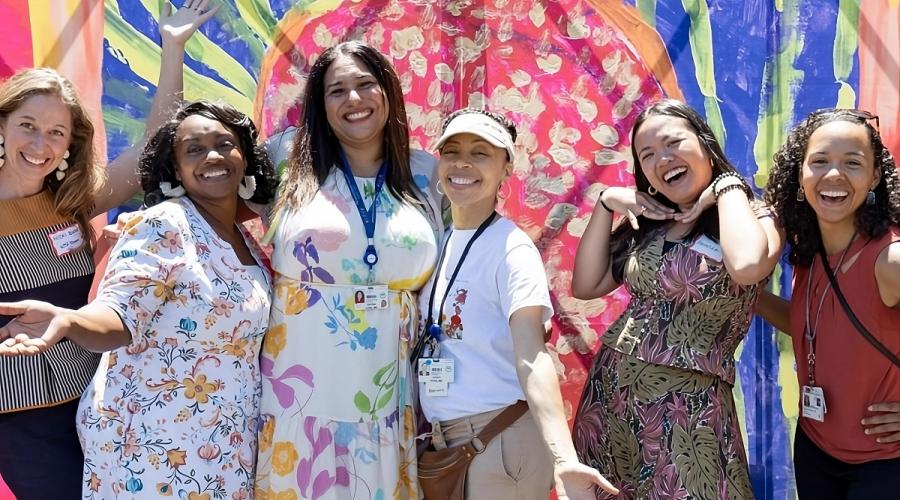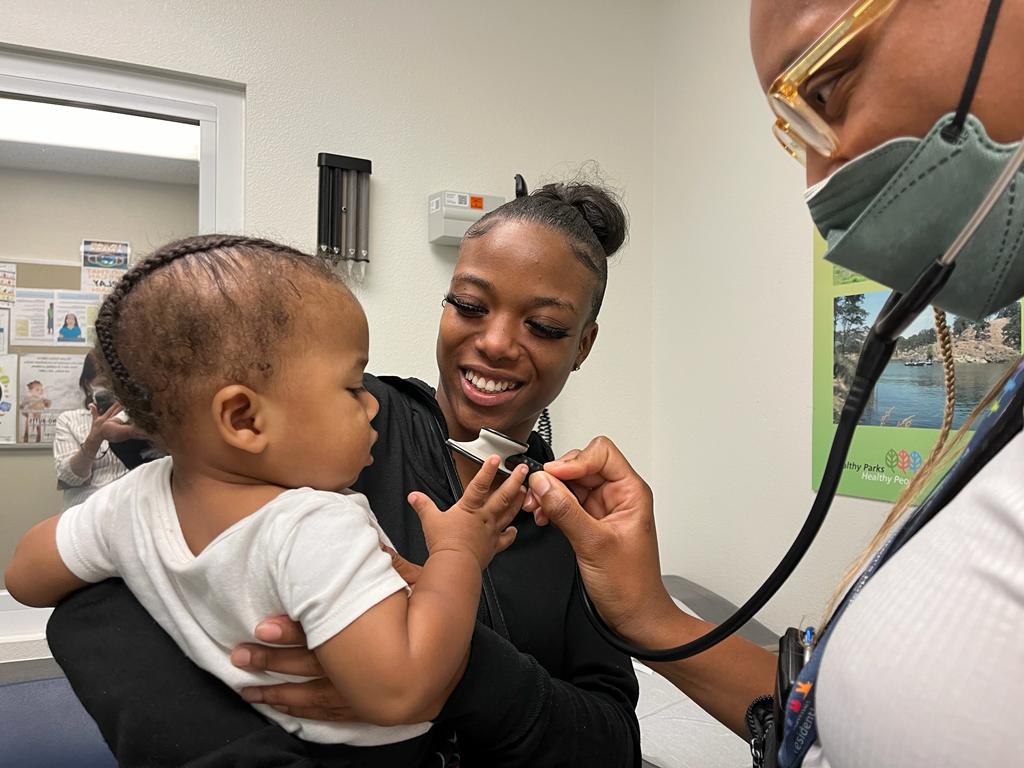
BLOOM: A Health Equity Clinic Bridging Gaps in Care for Black Children and Families
A transformative shift in primary care is starting in Oakland with a clinic specially designed for Black caregivers and babies.
With a growing body of evidence showing that health outcomes improve when Black providers treat Black patients, UCSF Benioff Children’s Hospital Oakland launched a new clinic in 2023 to provide Black families with a care team who share their racial identities and thus intimately understand the unique challenges they face.
The BLOOM clinic, co-founded by UCSF pediatricians Dayna Long, MD, and Javay Ross, MD, serves newborns up to three years old with a bolstered care team equipped with the medical expertise and cultural knowledge to create a space where families feel comfortable, safe, and listened to.
“There is something to be said about the improved health outcomes in Black babies that receive care from a racially concordant provider. In the NICU, Black newborns cared for by Black providers have nearly a 60% reduction in mortality. This is hugely impactful data that emphasizes making this approach to patient care an option for Black families and highlights the importance of recruiting Black pediatricians to be able to impact this health disparity for years to come,” said Ross. “We see ourselves and our own family in the families we serve; that makes a difference.”
One BLOOM parent said that, at their previous clinic, they felt consistently talked over and ignored. These experiences create distrust in the medical system, and in pregnant people, the associated stress can start biological processes that can make the baby born too early or smaller than expected.
“Our clinic is about celebration and joy. Black parents know we have their child’s best interest at heart and that they can ask us any question without being judged,” said Long.
Designing BLOOM
The conceptualization of BLOOM emerged in the wake of national conversations about racial justice following the death of George Floyd in 2020. Long identified in her work that the first three years of life are a critical window for intervention, supported by extensive developmental research as foundational for long-term health and success. She partnered with Ross, who has a keen interest in addressing the preschool-to-prison pipeline, to think big and radically about how they could enact change for the patients served in Oakland.
The clinic’s design reflects a multidisciplinary approach informed by evidence from many fields. Social workers, health educators, lactation specialists, and therapists all work with the team of pediatricians to partner with families to address as many issues in the moment as possible. This approach helps expedite access to care, eliminating some barriers contributing to systemic injustices in medicine.
During a standard check-up, one mother said that nursing had become painful. After spending some time with the clinic’s clinical lactation specialist (who is also a certified doula), she learned that her baby had a narrow pallet, contributing to the painful latch. She received coaching that day on how to use nipple shields. That evening, she was nursing her baby without pain. This type of in-the-moment work hopes to extend the duration of nursing for this mother-baby dyad, which can have innumerable positive downstream effects.
“There are dramatic differences in sustained breastfeeding rates between Black mothers and other races, and our at-the-ready lactation specialist is just one way we’re addressing the community’s needs,” said Long. “We also have mental health clinicians to check the parents’ wellbeing at every appointment.”

Impact on Patients and Care Teams
Early research shows that Black parents love BLOOM. 98% of patients have expressed extreme satisfaction with the clinic, and no-show rates seem considerably lower than traditionally seen.
Comments from parents, collected by research intern Jason Tesfa, show that a strong relationship is developing between providers and patients. “We wanted a Black pediatrician who understands the needs of Black children. BLOOM felt focused on us, so it was easy to build relationships with the staff,” said one parent.
These positive interactions leave a considerable mark on care providers, too. “So many trainees who identify as underrepresented in medicine (URM) pursued a medical career to help communities in need. Having the opportunity to serve the Black community in BLOOM can be an anchor for our work, fostering joy and purpose to help combat the burnout many providers, especially those who are URM, face,” said Ross.
Ongoing Research and Future Directions
Over time, research teams led by Department of Pediatrics faculty Nicki Bush, PhD, and Kayla Karvonen, MD, will see how this translates to improved health outcomes.
Dr. Long and Dr. Ross are collaborating on a guide for institutions interested in replicating this model, drawing on their clinical experience and ongoing research. The guide will serve as a resource for healthcare systems aiming to create culturally responsive, community-centered care that addresses racial disparities in health outcomes.
More information and ways to schedule an appointment can be found on the BLOOM clinic website.
